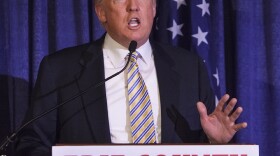During Monday's meeting in Washington between Canadian Prime Minister Justin Trudeau and President Donald Trump, the latter hinted that he'd like to "tweak" the North American Free Trade Agreement. Locally, economic leaders on both sides of the US-Canada border say NAFTA has proven to be beneficial to this side of the Niagara and shouldn't be overhauled.
President Trump has on numerous occasions expressed his dissatisfaction with global trade deals, including NAFTA. His complaint about NAFTA is that it has unfairly benefited Mexico at the expense of U.S. jobs. During Monday's White House meeting with Prime Minister Trudeau, Trump advised his Canadian counterpart he'd like to make trading easier between the two nations, which already engage in a $2 billion-per-day exchange of goods and services.
"Tweaking" NAFTA would be one thing but a greater overhaul could potentially do more harm than good, local economic leaders suggest.
"Trade has stimulated economic growth and really increased the standards of living of both Americans and Canadians," said John Manzella, president and CEO of the World Trade Center Buffalo Niagara. "If for some reason you boost tariffs between these two countries or eliminate a NAFTA, you're throwing a wrench into very sophisticated supply chains."
Manzella went on to explain that says since NAFTA was introduced, many industries in the U.S. and Canada have produced goods together to sell on the global market.
"We no longer produce goods for each other's retail shelves. We produce together for the shipment of products to Europe," he said. "For example, we may originate a product here in Buffalo, it may be shipped to Hamilton where additional components are added and the product's refined. Then it may be shipped to Detroit for additional refinement and additional production, and then it's packaged and exported to a user in Europe."
Many Upstarte New York jobs, Manzella told WBFO, rely on such a supply chain.
In some industries, though, the U.S. enjoys a job surplus compared to Canada. James Thibert, general manager of the Fort Erie Economic Development and Tourism Corporation, says Canada sends raw materials south, such as lumber, while the U.S. sends back finished products.
"When the United States is importing $280 million worth of goods, they're generally importing raw materials," Thibert said. "When we're importing $295 million worth of goods, we're importing into Canada finished product. Some American has made that product."
Thibert says it's good to revisit trade deals but throwing NAFTA out would be, in his words, like throwing out the baby with the bath water.







